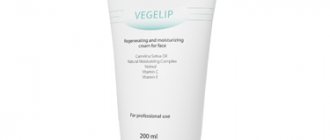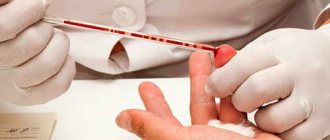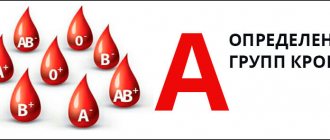Why is blood thinned?
Bleeding disorders can occur at any age. First of all, this problem concerns everyone over 50 years of age. Thick blood puts additional stress on the heart. This is due to the fact that it is more difficult to pump thick liquid through a huge circulatory system; more power is required, which the heart must produce. At the same time, the pulse becomes faster and the tremors become stronger. During such work, the heart muscle wears out faster, the valves fail, and the tightness of the atria is compromised.
Another danger of thick blood is the formation of blood clots. Thrombi are individual clots that form as a result of platelets sticking to each other. The resulting blood clots attach to the walls of blood vessels and interfere with blood flow. But the worst thing for a person’s life is a detached blood clot. As it rushes through the circulatory system, the current carries it to the lungs and then to the heart. By blocking the lumen of an artery in one of the organs, a blood clot causes an ischemic stroke, which often leads to death.
In addition, thick blood cannot supply organs and tissues with nutrients in a timely manner, which is why the body suffers from mild forms of hypoxia. The thicker the biological fluid, the more difficult it is for it to rise from the lower extremities to the heart. As a result, blood stagnation in the veins, thrombosis and varicose veins appears.
7 more healthy foods in your diet
In addition to citrus, you can reduce blood viscosity by regularly consuming a number of other products.
- Apple vinegar. It is a derivative product of the natural fermentation of apple juice. Its slightly acidic environment is as useful for normalizing blood consistency as lemon. Read more about the benefits of vinegar for blood vessels here.
- Linseed oil. It contains polyunsaturated fatty acids and normalizes lipid metabolism, which has a positive effect on normalizing blood thickness and clotting. Flaxseed oil also cleans blood vessels. But you need to use it daily, in courses, a tablespoon in the morning, preferably on an empty stomach.
- Cranberry. Cranberries also cleanse blood vessels and make the blood more fluid. It can be consumed in any form, without heat treatment: fresh, frozen, dried.
- Garlic. Garlic is extremely beneficial for blood vessels and blood. It is used fresh. You can add seasoning to any prepared dishes or make healing mixtures with lemon and honey.
- Honey. The sweet apiproduct is known for its properties beneficial to the circulatory system. The main thing in consuming honey is not to heat it above 60 degrees. A teaspoon on an empty stomach or a mixture of honey with lemon, garlic or horseradish will prevent thrombosis, varicose veins and stroke.
- Carrot-beet juice. It not only supplies the body with a large amount of minerals and vitamins, but also makes the blood vessels more flexible and the blood cleaner and more fluid.
- Figs Contains a concentrate of substances that improve the composition of the blood by saturating it with useful microelements, removing excess cholesterol and reducing its viscosity.
Check out the other products in the infographic:
Thinning agents
The most affordable ones today are drugs based on acetylsalicylic acid, better known as Aspirin. Such medications are common in pharmacies and cost little. Due to the fact that acetylsalicylic acid carries certain risks for the hematopoietic system and can cause gastric bleeding or ulcers, medicine has actively begun to work on the creation of drugs free from aspirin. Such dosage forms are available in pharmacies today. This group of drugs is divided into two subgroups
- antiplatelet agents that prevent blood cells from sticking together.
- anticoagulants, which prevent the formation of fibrin clots during coagulation.
Such drugs can be prescribed not only to older people to thin the blood, but also to pregnant women, in order to ensure the best blood flow between mother and fetus. A course of taking medications from this group saturates the blood with oxygen, which is very important for the developing fetus.
Etiology of the problem
Doctors identify a number of factors that affect blood thickening:
- severe dehydration (dehydration);
- drinking chlorinated or carbonated water;
- acidosis (general acidification of the body);
- enzyme deficiency;
- deficiency of macro- and microelements in the body;
- hypo- and vitamin deficiencies;
- malignant neoplasms;
- exposure to systematic stress;
- errors in nutrition;
- taking contraceptive medications, diuretics;
- kidney and digestive system disease;
- disruption of the process of fluid absorption in the body.
Risk group
Increased blood clotting is diagnosed in many people, but there are cases when patients are more susceptible to the above pathology.
In the presence of certain diseases, blood clotting increases significantly:
- thrombophlebitis;
- cardiac ischemia;
- stroke;
- malignant hypertension;
- pregnancy;
- obliterating atherosclerosis;
- varicose veins;
- obesity;
- pulmonary thromboembolism.
Antiplatelet agents
The main indications for prescribing antiplatelet agents are:
- Cardiac lesions that have led to a lack of blood circulation in the myocardium or completely deprived it of blood flow.
- Ischemic heart lesions, especially those accompanied by tissue necrosis.
- Arrhythmia.
- Tachycardia.
- Prevention of thrombosis in patients who have had a stroke.
- Heart surgery or interventions to restore the circulatory system (stenting).
- Arterial damage.
The cost of such medicines is slightly higher than those containing acetylsalicylic acid. As a rule, such medications are taken in a course, which ensures high rheological properties of the blood constantly.
Cardiomagnyl
This drug contains two active substances: magnesium hydroxide and acetylsalicylic acid. Aspirin inhibits platelet aggregation and blocks thromboxone synthesis. And magnesium hydroxide protects the mucous membranes of the gastrointestinal tract from the aggressive effects of acetylsalicylic acid. Cardiomagnyl is prescribed for the prevention of heart attack and stroke, thrombosis and angina. Cardiomagnyl is also taken by those patients who have already had a heart attack in order to prevent another. The medicine is sold without a prescription. The price of Cardiomagnyl is about 116 rubles for 30 tablets.
Cardiomagnyl
Nycomed Pharma, Germany
Preventive therapy for increased platelet aggregation in: thrombosis and embolism, coronary heart disease, myocardial infarction, ischemic strokes and cerebrovascular accidents, migraine.
Used for the prevention of thrombosis in cardiovascular surgery (in the postoperative period after coronary angioplasty, coronary artery bypass grafting). from 96
5.0 1 review
2912
- Like
- Write a review
Preparations without acetylsalicylic acid
Patients over 18 years of age who do not have problems with the gastrointestinal tract are safely prescribed medications containing aspirin. Especially if the duration of use does not exceed 5-7 days. In other cases, it is recommended to avoid consuming large doses of acetylsalicylic acid, especially in older patients.
The list of antiplatelet agents that do not contain aspirin includes:
- Curantil with the active ingredient dipyridamole.
- Ticlid, whose action is based on ticlodipine.
- Plavix, blood thinners thanks to cropidogrel.
- Brilint, which is based on the active ingredient ticagrelor.
- Efficient, working thanks to prasugrel included in the composition
- Pletax with the active ingredient cilostazol.
- Trental, whose action is due to pentoxifylline.
A wide selection of drugs allows a competent doctor to select an individual course of therapy for each patient, based on possible side effects and the presence of chronic diseases in the patient.
Aegitromb
“Egithromb” is usually used to prevent complications from heart attack, stroke, arterial occlusive disease, acute coronary syndrome, angina pectoris and atrial fibrillation. The active ingredient of the drug is clopidogrel hydrosulfate. The drug binds perfectly to plasma proteins (94-98%). The therapeutic effect occurs within two hours after taking Egithromb. After 4-7 days of taking the drug, blood density indicators return to normal. The doctor may prescribe a blood thinner, depending on the severity of the disease, from several days to six months. The price of “Egitromba” is about 883 rubles for 28 tablets.
Aegitromb
Egis, Hungary
- prevention of atherothrombotic complications in adult patients with myocardial infarction (with a duration of several days to 35 days), ischemic stroke (with a duration of 7 days to 6 months) or occlusive peripheral artery disease;
— prevention of atherothrombotic complications in adult patients with acute coronary syndrome with ST segment elevation with the possibility of thrombolytic therapy (in combination with acetylsalicylic acid); - prevention of atherothrombotic complications in adult patients with acute coronary syndrome without ST segment elevation (unstable angina, myocardial infarction without Q wave), incl. in patients undergoing stenting (in combination with acetylsalicylic acid); - prevention of atherothrombotic and thromboembolic complications, including stroke, in atrial fibrillation in adult patients who have at least one risk factor for the development of vascular complications, who cannot take indirect anticoagulants and have a low risk of developing from 714
833
- Like
- Write a review
Chimes with depyridamole
This drug can be called mandatory for use by pregnant women after the 20th week of gestation. In the annotation you can read a phrase warning about possible risks. If a local obstetrician-gynecologist has prescribed a course of Curantil, this indicates that the woman is not at risk and can safely take a blood thinner.
The medicine accelerates the blood, allowing the expectant mother to share nutrients with the child. Taking Curantil will ensure the full development of the unborn baby.
Water
Water is the main fighter against thick blood
If you don't drink enough water, dehydration sets in, which can cause your blood to thicken, increasing the risk of a blood clot. On average, you need to drink two liters of water a day, but no less. One way to check if you're on the right track is to test your urine. If it's pale yellow or clear, you're probably drinking enough, but if it's amber or darker, you need to increase your daily water intake.
Of course, people with certain medical conditions, such as congenital heart defects, may need blood thinners to reduce their risk of heart attack or stroke. If you have any health concerns, you should consult your doctor before introducing these foods into your daily diet, as they may interfere with some medications.
Description of the drug Tiklpid
Taking Triclid can reduce the aggregation of blood platelets and significantly reduce the viscosity of biological fluid. Violation of the prescribed treatment regimen and overdose can lead to the following adverse reactions:
- bleeding;
- lack of platelets necessary for natural blockage of damaged areas of arteries, vessels and tissues;
- decreased levels of white blood cells;
- abdominal pain;
- diarrhea.
In case of severe blood thickening, the drug is prescribed for a long course, and the patient’s condition is regularly monitored. When the rheology of the main biological fluid is restored, the drug can be discontinued. However, stopping the medication does not replace regular blood quality testing.
Fraxiparine
The active substance of the drug is nadroparin calcium (derived from heparin). The medicine effectively thins the blood and prevents the formation of blood clots because it binds well to plasma proteins. The bioavailability of the drug is approximately 98%; Fraxiparin is absorbed within three to five hours. This blood-thinning drug is prescribed for the treatment and prevention of thromboembolism, angina pectoris, and to prevent blood clotting during dialysis. The price of Fraxiparin is about 2,540 rubles for 10 syringes.
Fraxiparine
Symptoms of the disease
In order to understand whether a person has a problem with blood clotting, he needs to undergo a comprehensive diagnosis. Also, with increased blood clotting, the following symptoms may occur:
- sleep disturbance;
- cold upper and lower extremities;
- noise in ears;
- chronic fatigue;
- absent-mindedness;
- hyperfatigue;
- depression.
Note.
The above symptoms can accompany many pathologies. If a person observes them in himself, then it is impossible to say unequivocally that he has increased blood density. To make an accurate diagnosis in this case, you need to consult a qualified doctor.
Apple vinegar
Many consider this product an indispensable aid for maintaining health, systematically using it according to a proven scheme. We can say for sure that apple cider vinegar is hard to harm the body. Therefore, its use can be considered a relatively safe activity. Many of its positive effects on the body have been recorded, one of which is a decrease in blood viscosity.
The mechanism of this action can be explained by its slightly acidic reaction caused by natural beneficial components. Their entry into the body helps eliminate toxic acidic compounds, which are replaced by the active components of apple cider vinegar. At the same time, metabolic acidosis in the blood is eliminated, which helps it acquire more liquid properties compared to the initial level. Naturally, to achieve such an effect, it is necessary to systematically take the substance, which can easily replace the daily use of tablets with the same effect.
Proper intake of apple cider vinegar should be done in the morning. This is a very important condition, since at this time the body is most capable of discharging oxidized products. The recipe for preparing an aqueous solution consists of a glass of warm water and two teaspoons of apple cider vinegar. A single daily dose is sufficient. The duration of the course is from 2-3 months to a year with 10-15 day breaks every 2 months. The only contraindication is gastroduodenitis, peptic ulcer with increased stomach acidity.
More details:
The benefits and harms of apple cider vinegar and its treatment
Expert opinion
There is a popular belief that in order to prevent thrombosis it is necessary to constantly thin the blood. Alexander Shishonin recommends that his patients undergo comprehensive diagnostics before blood thinning. He notes that blood fluidity depends on many factors. First of all, it is determined by the ratio of formed elements to blood plasma. In medicine, this indicator is usually called hematocrit.
Important.
For patients with elevated hematocrit, doctors recommend thinning the blood, but if it is low, this should not be done, since it is already very liquid, that is, it contains very few formed elements. In this case, thinning the blood is even dangerous to human health.
Changes in hematocrit are associated with severe diseases. An elevated hematocrit may be associated with the following diseases:
- pathology of the adrenal glands;
- tumors in the uterus;
- kidney and lung diseases;
- peritonitis;
- dysfunction of the hematopoietic system;
- profuse vomiting;
- dehydration;
- extensive burns.
The following diseases can cause a low hematocrit:
- anemia;
- oncological diseases of the bone marrow;
- cirrhosis of the liver;
- large blood loss;
- hemoglobinopathy;
- pathological hemolysis;
- overhydration;
- chemical poisoning (mushrooms, snake and insect bites);
- lack of iron in the body;
- poor nutrition;
- vitamin B12 or folic acid deficiency;
- artificial heart valve transplantation.








